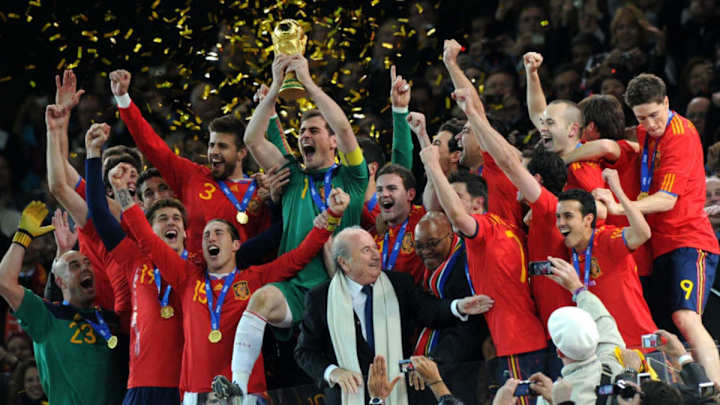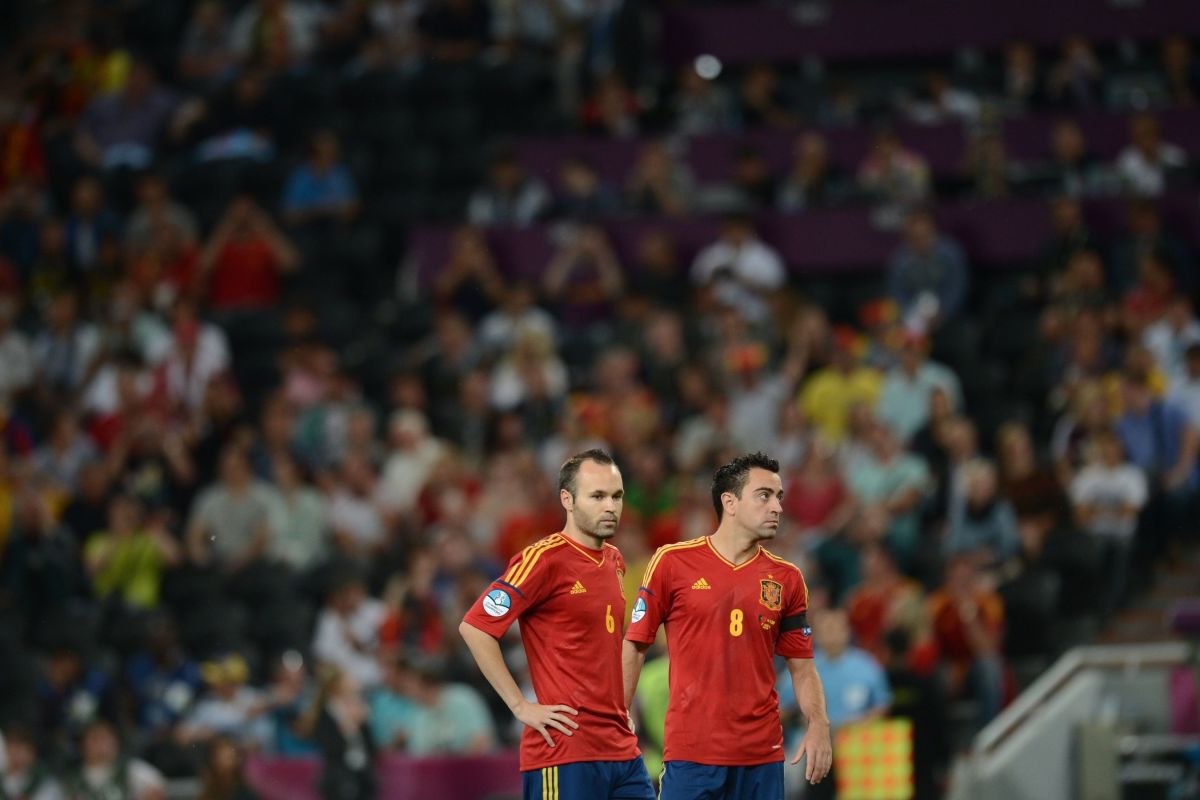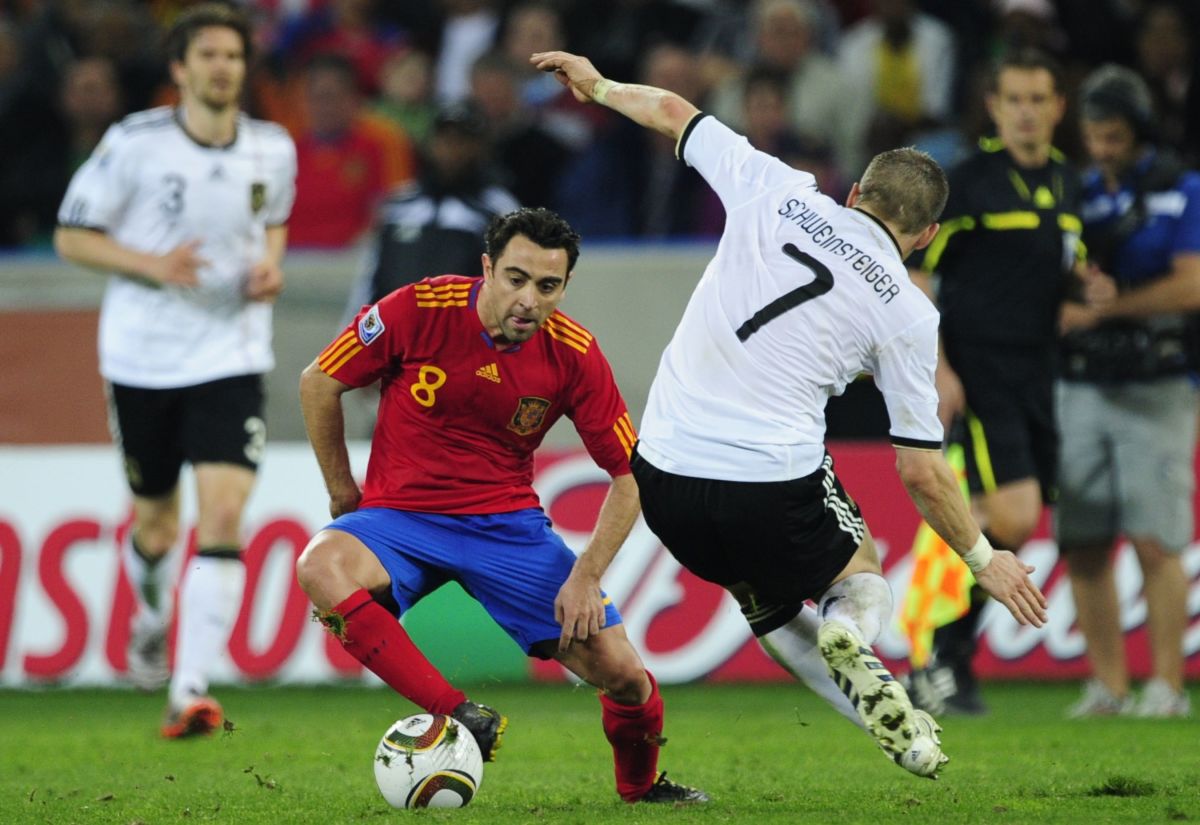World Cup Countdown: 4 Days to Go - Midfield Maestros Xavi & Iniesta Guide Spain to Maiden World Cup

While the term 'Golden Generation' can act as a burden on a group of players, there was no better way to describe Spain's national team during the late 2000's.
Ending a 44-year wait since their only tournament success by winning Euro 2008, that would prove to be only the beginning of what was a golden age in Spanish football in every sense of the word, with two unassuming figures masterminding their footballing dominance that would culminate in a World Cup.
There are few midfield duos that compare to the talents of Xavi Hernandez and Andres Iniesta both in terms of trophies but also their level and consistency of performance, especially during 2010, as the diminutive pair guided La Roja to World Cup glory in South Africa.

At the forefront of a Spanish football revolution in 2008, products of La Masia Xavi and Iniesta were perfectly set to deal with lofty expectations of a nation in waiting, having won numerous La Liga and Copa del Rey titles and both claiming a 2006 Champions League winners medal for club side Barcelona.
Under the management of Luis Aragones, Spain's 'tiki-taka' brand of football swept through the tournament in Austria and Switzerland, winning every match en route to the final against Germany, where a defence-splitting pass from Xavi allowed Fernando Torres to score the only goal of the game, sealing only Spain's second major honour in the process.
With spirits high, the following domestic season would be a historic one following the appointment of former Barca midfielder Pep Guardiola, the man who famously told Xavi: "You're going to retire me," while stating Iniesta "is going to retire us all."
The 2008/09 season finish with the Catalan side becoming the first from Spain to claim a treble of league, cup and Champions League, with the final in Rome against Manchester United staging a midfield masterclass from Xavi and Iniesta - complemented well by an emerging Sergio Busquets - leaving Sir Alex Ferguson to state: "I don't think Iniesta and Xavi have ever given the ball away in their lives. They get you on that carousel and they can leave you dizzy."
Happy 36th birthday to @FCBarcelona legend Xavi.
— B/R Football (@brfootball) January 25, 2016
8x La Liga
4x Champions League
2x Euros
1x World Cup#Barca pic.twitter.com/k9UvQKKxmi
Missing only a World Cup trophy from their illustrious collection, 2010's tournament gave the pair the chance to put that right. Part of Vicente Del Bosque's squad that contained Barca teammates such as Carlos Puyol, Gerard Pique, Pedro and Busquets alongside the likes of Iker Casillas, Sergio Ramos, Xabi Alonso, Cesc Fabregas, David Villa, David Silva and Fernando Torres, Spain were rightly considered among the favourites.
For Iniesta however, his journey to the 2010 World Cup was far from ideal. Not only contending with injuries for much of the season, the Spaniard was also dealing with the death of close friend Daniel Jarque in 2009, an event that he would find difficult to come to terms with.
On the field, Spain's tournament would start with a defeat, losing their opening Group F game
1-0 to Switzerland despite dominating both territory and possession. Confounding the defeat,
Iniesta had to prematurely depart from the game due to injury, subsequently missing the next game against Honduras, as questions marks were placed over his fitness and Spain's tactics.
Despite the early setback, the belief in their football wouldn't waver, as Xavi recalled a meeting with Del Bosque the morning after the Switzerland game, with his manager stating: "Xavi, I’ve watched the game over and over and I don’t think we should change a thing," much to the delight of the midfield general, who retorted: "I was so happy."

The defeat to the Swiss would be Spain's only one during the World Cup, managing to return to winning ways against Honduras, before a returning Iniesta scored the winner against Chile that left the Spaniards top of Group F.
A succession of 1-0 wins against Portugal, Paraguay and Germany in the knockout stages
would see Spain through to the final in Johannesburg, as Xavi and Iniesta played vital roles, showcasing an almost telepathic understanding throughout. Picking up Man of the Match awards against the Portuguese and Germans, it would be from Xavi's corner that Puyol would head the winner against their fellow Euro 2008 finalists, while Iniesta took the Man of the Match award in the quarter finals.
With Xavi nicknamed 'Maki, the machine', in the Spain squad, and Iniesta tagged as 'Cerebro, the brain', the duo had lived up to their labels throughout their time in South Africa. Two key cogs that worked in unison, Xavi and Iniesta were anomalies in an era that craved strong, dynamic athletes, and no one could touch them.
🇪🇸 In 2010 Spain made more successful passes than any team since 1966 with 3547. They became the first side to ever win the World Cup after losing their opening game, but with a midfield of X.Alonso, Xavi, & Iniesta they possessed a formidable side. #ThePinnacleWorldCup 🏆 pic.twitter.com/i19gKbfxdc
— Pinnacle (@Pinnacle) June 1, 2018
Standing in the way of history for Spain would be another side bidding to win the World Cup for a first time in the shape of the Netherlands, although their style would be the complete antithesis of the artistry produced by Xavi and Iniesta. Abandoning their 'Total Football' philosophy for a more physical approach, but the pair would be well accustomed to robust tactics.
While the final at the Soccer City Stadium is remembered for Holland's blunt tactics to hinder Spanish hopes of a World Cup, Xavi and Iniesta would continue to play their game. As Nigel de Jong looked to imprint the pattern on the sole of this boot into the midriff of Alonso that would unfortunately summarise the showpiece, the machine continued to be Spain's midfield metronome, with the brain plotting the next assault on the Dutch goal.
Despairingly however, it looked as if brawn was going to subdue elegance as the game eclipsed 90 minutes, and had almost reached 120. Penalties were on the horizon, a lottery that Spain didn't deserve to enter, and fortunately they didn't have to.
Four minutes were left in the second period of extra time when Fabregas found Iniesta in space inside Holland's penalty area. With one touch to control, the little man for the big occasion would rifle his second past Maarten Stekelenburg and confirm Spain's place at the pinnacle of world football, while taking the time to dedicate his goal to friend Dani Jarque that had died before the tournament, revealing a message under his shirt that translated to read: "Dani Jarque, always with us.".
ON THIS DAY: In 2010, Spain won their first ever World Cup thanks to Andres Iniesta's 116th-minute goal. pic.twitter.com/l1qR85luMV
— Squawka (@Squawka) July 11, 2016
Named Man of the Matchl, Iniesta was the star in the final with his individual moment, although it was his routines as a double act that left those in attendance during the World Cup amazed.
Both he and Xavi were cornerstones that symbolised the image of Spanish football. Technically gifted, slight of stature with an appreciation of space, movement and passing, yet it was all underpinning by something all successful needs: a winning mentality.
Andrés Iniesta was named Man of the Match in the:
— Squawka (@Squawka) April 27, 2018
2010 World Cup final
2012 European Championship final
2015 Champions League final
2016 Copa del Rey final
A man for the biggest occasions of them all. 🙌 pic.twitter.com/DoUUBeuQIm
"When we won the World Cup, Iniesta played very well. Along with Xavi, Andres is the only Spaniard who could have won the Ballon d'Or," were the words of Fabregas on the pair, yet while a Ballon d'Or would escape both, their talents are indisputable, their place in history together undeniable.
A 'Golden Generation' in more than just name, Spain become only the third European nation to simultaneously hold both the European Championships and the World Cup after Germany and France, and it wouldn't be until 2014 when their time at the top was over, winning a second consecutive Euro's in 2012, with Maki and Cerbero in usual harmony.
